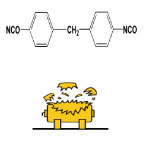| Case Name |
Rupture of a drum can caused due to reactions of chemicals with water |
| Pictograph |

|
| Date |
August 26, 1993 |
| Place |
Tokushima, Tokushima, Japan |
| Location |
Truck terminal |
| Overview |
Diphenyl-methane diisocyanate (popular name MDI), of which contact with water is prohibited strictly, was stored in a drum can prior to being returned. The drum can ruptured during storage. Dewing occurred due to the temperature difference between the daytime and the nighttime. The liquid water reacted with MDI, and carbon dioxide was generated, pressure rose, and the drum can ruptured. |
| Incident |
During disposal of Diphenyl-methane diisocyanate (popular name MDI), it came into contact with water in a drum can, which is strictly forbidden, and the drum can ruptured. |
| Processing |
Waste and disposal |
| Chemical Equation |
Fig2.Chemical reaction formula
|
| Substance |
Diphenylmethane diisocyanate, Fig3 |
| Carbon dioxide, Fig4 |
| Water, Fig5 |
| Type of Accident |
Rupture |
| Sequence |
1. MDI was no longer necessary as a manufacturing method had changed.
2. Unnecessary MDI was transferred to a drum can to be returned to the manufacturer.
3. The drum can ruptured during storage, and the main body of the drum can blew off. |
| Cause |
MDI reacted with water generated by dewing in the drum can, carbon dioxide was generated, and the drum can's internal pressure rose. |
| Countermeasures |
1. The prohibition of contact with water is observed thoroughly. At the minimum, a visual inspection must be made before transfer to a container when contamination is prohibited.
2. Countermeasures against contact with moisture in the air in handling should be taken.
3. Storage methods of a container are reviewed.
4. Education in contamination prohibition and danger with moisture is given to operators. |
| Knowledge Comment |
Water and oxygen exist everywhere. Condensed water can accumulate when there is a temperature difference between the daytime and the nighttime, even if there is no visible liquid water. It is necessary to carry out sufficient monitoring of a container, etc. |
| Background |
The operating company knew the danger of contact between MDI and water. However, management of the drum can of MDI was insufficient, and dewing occurred inside. Although the drum can needed to be stored tightly shut, the lid was loose. Dew was generated in the can by the temperature difference between the daytime and the nighttime. |
| Reason for Adding to DB |
Example of rupture caused due to dewing from temperature difference between the daytime and the nighttime |
| Scenario |
| Primary Scenario
|
Organizational Problems, Poor Management, Slackness of Management, Poor Value Perception, Poor Safety Awareness, Insuficient Education/Training for Safety, Carelessness, Insufficient Precaution, Inadequate Handling, Usage, Transport/Storage, Storaging Method, Malicious Act, Rule Violation, Safety Rule Violation, Bad Event, Chemical Phenomenon, Abnormal Reaction, Secondary Damage, External Damage, Rapture
|
|
| Sources |
Japan Industrial Safety and Health Assoc. Safety and Health information center, Case of labor accident No.765. Chemicals reacted with water, and drum can was ruptured, The Japan Industrial Safety and Health Assoc. home page
|
| Physical Damage |
The slate roof of a truck terminal was damaged. |
| Multimedia Files |
Fig3.Chemical formula
|
|
Fig4.Chemical formula
|
|
Fig5.Chemical formula
|
| Field |
Chemicals and Plants
|
| Author |
KOBAYASHI, Mitsuo (Office K)
TAMURA, Masamitsu (Center for Risk Management and Safety Sciences, Yokohama National University)
|
|